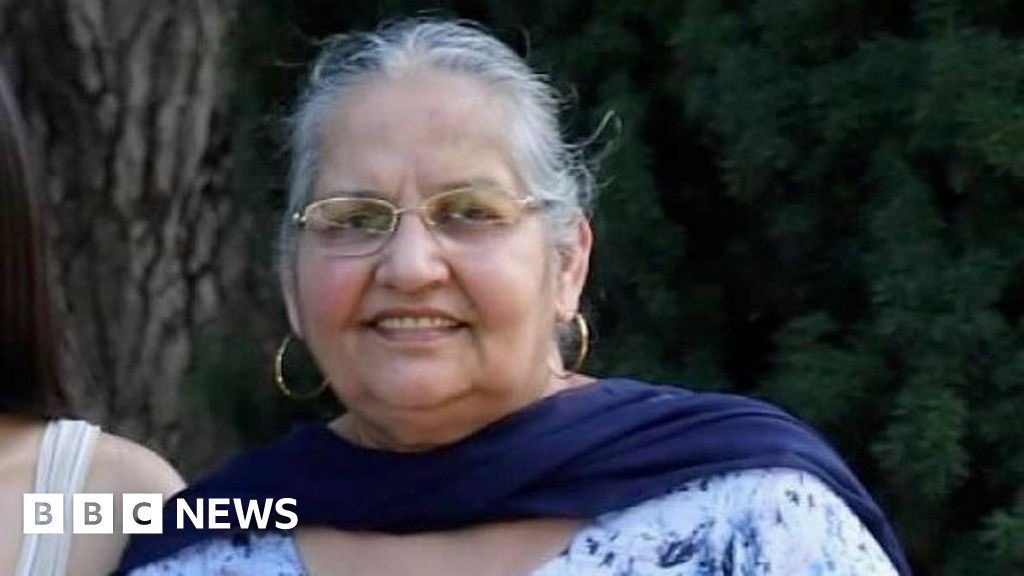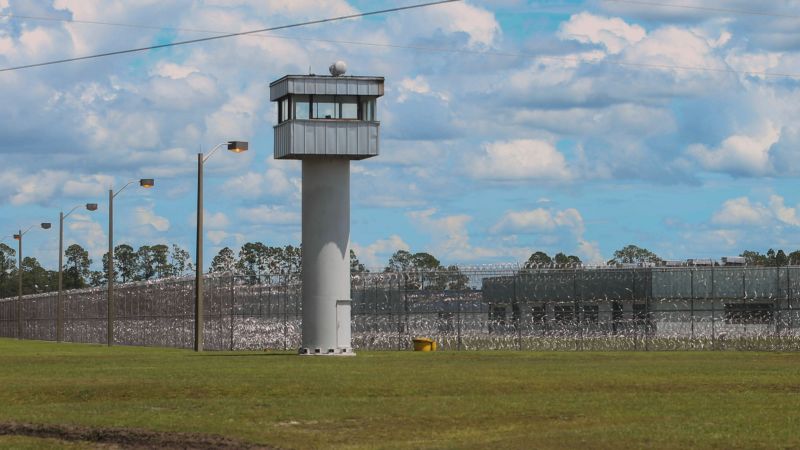Before dawn on June 21, Narciso Barranco loaded his weed trimmer, lawn mower and leaf blower into his white F-150 pickup. He had three IHOP restaurants to landscape and then seven homes. His goal was to finish in time to cook dinner with his wife, Martha Hernandez.
It was a cool Saturday morning in Tustin, Calif., about 35 miles south of Los Angeles. After wrapping up work at the first IHOP, Mr. Barranco stopped to buy a wheel of fresh white cheese. He returned home and left it on the kitchen counter for Ms. Hernandez before driving seven minutes to an IHOP in Santa Ana.
He paid no attention to the Home Depot across the parking lot. Later, he would wish he had been more aware.
Migrants for decades have gathered outside the big-box stores, hoping a contractor or homeowner might offer a day’s work. But under President Trump’s immigration crackdown, Home Depot has become a prime target for federal agents under pressure to round up undocumented people like Mr. Barranco, who slipped across the border from Mexico more than 30 years ago.
Mr. Barranco, 48, was weeding between bushes when men in masks descended on him. He raised the head of his weed trimmer as he retreated. The authorities would say they believed he was attacking them; Mr. Barranco’s family said he was scared and just trying to move away, not to harm anyone. But in a tweet, the Department of Homeland Security would cite that moment to justify what happened next.
Mr. Barranco’s memory of his arrest is fragmented: the blinding sting of pepper spray; beefy federal agents taking him down and pinning him to the pavement; their relentless blows; the pain radiating from his left shoulder.
He didn’t dispute that he was in the country unlawfully. Still, he pleaded his case to the agents as they wrenched his arms behind his back.
“I have three boys in the Marines,” he recalled blurting out in English.
Surely that would count for something?
Who Should Be Deported?
Mr. Trump’s mass deportation project is forcing many Americans to confront the question of what kind of country they want.
According to polls, Americans strongly agree that immigrants without legal status should be deported if they have been convicted of a violent crime. But support for Mr. Trump’s immigration sweeps begins to erode when people are asked about the much larger group of undocumented immigrants with no police record who have worked and raised families in the United States.
The arrest of Mr. Barranco, a Latino man doing a job that many other Latinos in California do, quickly became a rallying point for those who believe enforcement actions have gone too far. A slight man with a reserved demeanor, Mr. Barranco had built a life in the shadows, tending the lawns and flower beds of Southern California’s suburban homes and commercial properties. He had no criminal record.
All three of his sons are United States citizens, having been born in California. Alejandro, 25, was a combat engineer who deployed to Afghanistan to assist with the U.S. withdrawal. Jose Luis, 23, was released from military duty last month and plans to study nursing. Emanuel, 21, is still in the Marines, based in San Diego. The sons could have sponsored him for a green card but were discouraged by the time it would take and the thousands of dollars it would cost.
Ms. Hernandez, Mr. Barranco’s wife and the stepmother of the three young men, is also an American citizen.
Walter Salaverria, the IHOP operations director who hired Mr. Barranco, described him as “humble, hardworking, not just about the money.”
He added, “If I had 50 restaurants, I would give them to him.”
For years, many Americans have relied on immigrants to do the jobs they avoided — cleaning, building, picking fruits and vegetables, manicuring lawns and gardens. Under previous Republican and Democratic administrations, undocumented people who worked hard and stayed out of trouble could largely expect to be left alone.
Now that masked federal agents are pepper spraying these people and tackling them in the streets, some Americans are thinking of them differently — or perhaps thinking of them for the first time.
A Tearful Voice Mail
After the agents subdued Mr. Barranco, they shoved him, hands shackled behind his back, into an unmarked vehicle. He was soon transferred to a van with another immigrant who said he had been snatched as he left the Home Depot.
Mr. Barranco said an agent flung water on his bloody face and head. He said he pleaded with the agent to tie his hands in front of him because his shoulder hurt. “I was crying,” he recalled. “I said, ‘I won’t run. Just tie my hands in front; I can’t stand the pain.’”
By nightfall, he was crammed into a constantly lit basement in downtown Los Angeles with 70 other men. The air was thick with stench and despair. There was one exposed toilet. Some men slept standing, he said.
Mr. Barranco left a tearful voice mail message for Alejandro, informing him that he had been arrested and didn’t know where he was being held. His wallet and cellphone were still inside his truck outside the IHOP. Could someone retrieve them?
Two days later, after locating his father, Alejandro drove to Los Angeles and waited nearly four hours to see him, only to be turned away, like dozens of others, when visitation hours ended.
When Alejandro finally laid eyes on his father the next day, Mr. Barranco was disheveled and dirty, still in the same long-sleeve shirt and jeans he was wearing when he was arrested. Father and son met across a glass partition.
“My father looked defeated,” recalled Alejandro, who kept his composure as he tried to assure his father that the family was “taking care of everything.”
Sergio Perez, executive director of the Center for Human Rights and Constitutional Law, had agreed to escort Alejandro and was allowed to meet Mr. Barranco without a barrier. Mr. Perez asked Mr. Barranco if he could hug him since his son could not.
“No,” replied Mr. Barranco. “I smell so badly. I haven’t been able to shower.” The lawyer embraced him anyway. Mr. Barranco wept.
The next day, Mr. Barranco was transferred to a privately run detention center in the high desert, about two hours away.
A New Country
Mr. Barranco was born in a village in Mexico, one of five children of campesinos who subsisted on the maize, beans, squash and tomatoes that they grew.
In 1994, he trekked through the desert to the border and sneaked undetected into Arizona. He made his way to California and began taking whatever work there was, in construction, restaurants, landscaping.
“I planned to save and return to Mexico,” Mr. Barranco said.
He married, and three boys came along, the first in 1999.
“I decided that if I took my kids to Mexico, they’d end up like me,” he said. “I thought, Here, I can work and ensure they have a better life.”
By 2002, Mr. Barranco had landed a job with a large landscaping company that offered benefits like health insurance. He began filing taxes.
The company trained him to properly prune trees, among other skills, and he became certified as an irrigation technician working on sprinkler systems. He was sometimes dispatched to Disneyland late at night to trim hedges. He later struck out on his own and built his client roster.
As his boys moved through elementary and middle school, Mr. Barranco, who only has a few years of formal education, took parenting workshops to support their success. In 2012, he received a Certificate of Congressional Recognition for his “faithful commitment and hard work” on behalf of his children’s education. That same year, after completing a nine-week “parental involvement program,” he earned a certificate guaranteeing that his sons would be admitted to any California state college after high school.
“Any opportunity to do something good to help them, I tried to take advantage,” he said.
Mr. Barranco and his first wife divorced in 2015. A few years later, he met Ms. Hernandez, then 58, at a Public Storage facility in Santa Ana where he kept some of his tools. He helped her haul a bed that she had kept there, and he gave her his number. Two weeks later, he helped her move more furniture and then called to check in on her. A friendship flourished.
“I was lonely, he was lonely,” said Ms. Hernandez, a widow whose children were grown. “We enjoyed each other’s company.”
On Mother’s Day in 2021, he joined her family for brunch. Mr. Barranco’s shrimp ceviche was a hit with her two sons and her parents. So was he.
“He was quiet at first,” her oldest son, Rigo Hernandez, now 40, recalled, “but there was a warmth about him that spoke louder than words.”
On Feb. 18, 2023, with the Pacific Ocean as their backdrop, they were married in a small ceremony officiated by Mr. Hernandez.
By then, all three of Mr. Barranco’s sons were in the Marine Corps.
“My father brought us up to respect this country and to appreciate the opportunities we would have,” Alejandro said.
‘I Never Thought This Could Happen’
Footage taken by bystanders of Mr. Barranco’s arrest went viral. The videos show several agents standing above him while others hold him down. One agent, kneeling at his side, strikes Mr. Barranco repeatedly in the head, neck and left shoulder as he groans. The agents force him into an S.U.V. with the aid of a metal rod.
The Department of Homeland Security posted a seven-second video of Mr. Barranco wielding the weed trimmer as agents pepper sprayed him. “Perhaps the mainstream media would like our officers to stand there and be mowed down instead of defending themselves?” Tricia McLaughlin, a department spokeswoman, wrote on X. The agency did not respond to a request for any additional comment beyond the post on X.
When Alejandro saw the videos, he flung his cellphone in anger.
The family gathered to make a plan. Alejandro, the only son released from active duty at the time, would take the lead in speaking out. Mr. Hernandez, Ms. Hernandez’s son, would contact federal and state lawmakers.
The family started a GoFundMe to raise money for a lawyer. The page featured photographs of the Barranco boys in uniform. In one image, Mr. Barranco is at a memorial service to fallen soldiers.
Alejandro began fielding news media requests. He tried to be measured in his comments. He said his father was a productive member of the community who hadn’t hurt anyone. The use of force by agents was excessive, unjustified and unprofessional, he said.
He said he felt betrayed by the country that he and his brothers loved and were willing to die for.
“There are many people in the military with immigrant parents like my dad,” Jose Luis said. “I never thought this could happen to him.”
The brothers expressed regret that they hadn’t managed to sponsor their father for a green card, which they were eligible to do as Americans and as servicemen.
“We saw a lawyer who wanted $5,000 just to start the process,” Alejandro recalled. He added, “Everyone was so busy in the military.”
Camaraderie Among Detainees
Mr. Barranco recalls being transported to the immigration detention center in Adelanto, Calif., with an Asian man, an African man and a fellow Latino. They arrived at the lockup, which can hold nearly 2,000 immigrants, before sunrise and waited all day to be processed.
In a barrackslike pod, he was assigned to I-33 “low,” the bottom bed of a metal-framed bunk. He received three blue shirts, two pairs of pants and one pair of underwear. His neighbor, in bunk I-32 low, eventually gave him an extra pair.
He counted 172 men in the room.
“I befriended several people,” Mr. Barranco said, producing a list with the names and cellphone numbers of eight detainees.
Mr. Barranco’s family deposited money into his account so he could make phone calls and buy items like chips, coffee and instant noodles to supplement the unappetizing institutional food, he said.
He shared both his phone and his commissary credit with detainees whose families did not know their whereabouts or who could not afford the expensive calls and items. One was an Iranian man whose wife was about to give birth.
One day, Mr. Barranco bought 10 packets of noodle soup mix and distributed them. Someone handed him a pencil. It gave him an outlet for his anguish, he said.
He began to scrawl on scraps of paper he found. Prayers. Feelings. Names.
A Path to Freedom
Mr. Barranco had no idea that his arrest had prompted protests and galvanized volunteers across Orange County.
Strangers delivered food, flowers and messages of support to his home.
Six days after his arrest, the Orange County Rapid Response Network, in coordination with his family, held a candlelight vigil and a peaceful march to honor Mr. Barranco and denounce indiscriminate immigration sweeps. Thousands of dollars flowed into the GoFundMe, enough to hire Lisa Ramirez, an immigration lawyer, to seek Mr. Barranco’s release, fight his deportation case and help him gain legal status in the United States.
Given that he is a father to a veteran, “Narciso could have been an American citizen by now,” Ms. Ramirez said.
Ms. Ramirez submitted a request to the government for “parole in place,” a program that allows undocumented parents of U.S. military members to remain lawfully in the country and work while they await approval for permanent residency.
Mr. Barranco’s wife, Ms. Hernandez, a U.S. citizen, offered another path, but one that would have required him to return to Mexico to complete the process. He would be separated from his family, likely for years, with no assurance he would be allowed to return.
Ms. Ramirez filed a motion for a bond hearing in immigration court. It included the birth certificates of his sons and proof of their military service, as well as the accolades from the school district and Congress for his parental involvement and other evidence of his good moral character.
Mr. Barranco had his hearing after 19 days in lockup. The government asked the judge to hold him without bond, as is common. Ms. Ramirez asked the judge to release him on the minimum bond of $1,500, arguing that he had three U.S.-born military sons and was not a flight risk.
The prosecutor requested a $13,000 bond. The judge set it at $3,000.
After his release five days later, Mr. Barranco stopped at an In-N-Out for a cheeseburger combo and vanilla shake.
Mr. Barranco made public remarks a few days after that at a news conference in downtown Santa Ana.
“To the community, I don’t have the words to truly express what I feel in my heart,” he said in Spanish, choking up. “So I can just say thank you for standing with my family and my children, for being by their side.” He also shared a message of hope for families of detainees.
A Working Man on Pause
Since his release, Mr. Barranco has mostly stayed home, venturing out on Sundays for church. Alejandro and Jose Luis, two of his sons, are covering his jobs.
He is alone while Ms. Hernandez is at work much of the day. His companions are Revoltosa, a cockatoo who has a predilection for perching on his right shoulder, and Snoopy, his small, fluffy white dog.
“They relieve my stress,” he said.
At 8 a.m. each day, he logs into a two-hour online English class. The ankle monitor he was fitted with before leaving Adelanto has since been removed. But three times a week, he must check in with Immigration and Customs Enforcement.
At 11:10 a.m. on a recent Thursday, during an interview for this article, his phone buzzed. His expression tensed as he entered a code and took a selfie, part of the monitoring protocol. Agents have also shown up at his door without notice.
He spends time in the garden, caring for his heirloom tomatoes, squash, peppers and cucumbers. A guava tree has recently taken root. He also tends the geraniums, jasmine and day lilies. In the kitchen, he puts his culinary talents to work preparing carne asada, ceviche and other dishes.
Mr. Barranco has also been keeping a journal. During an interview, he opened to the first page and read aloud. “At 4 a.m. on a Saturday, the routine of a poor gardener began. Then … ” His voice faltered and his face crumpled.
He tried to continue.
“Something happened that never could have been expected,” he said and then slammed the journal shut. “I can’t,” he said.
As of Tuesday, his lawyer had yet to receive acknowledgment from the government that his application for parole in place was under review.









